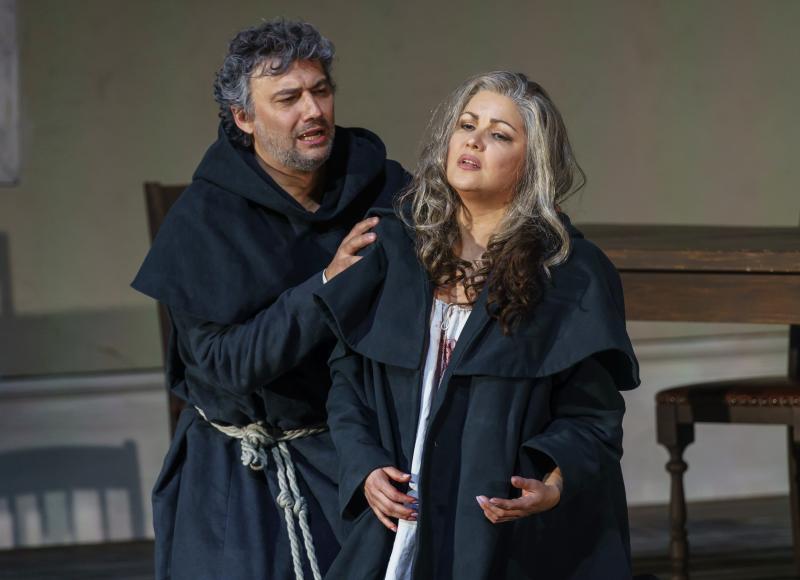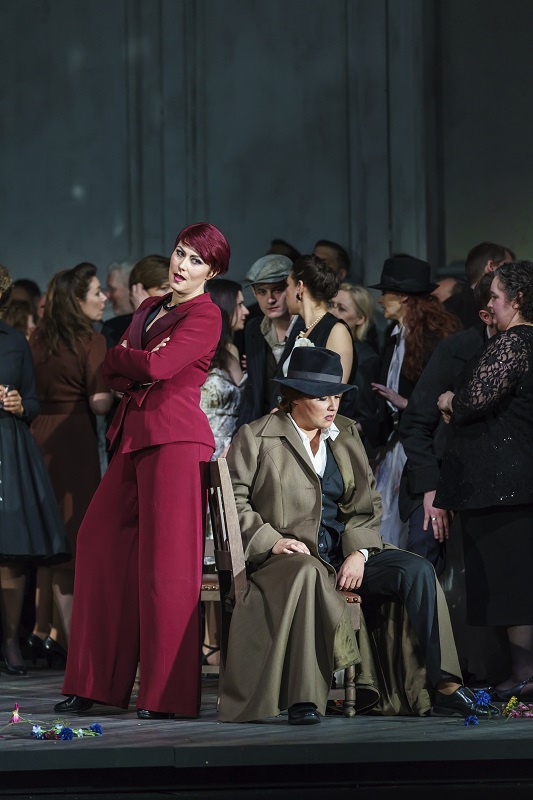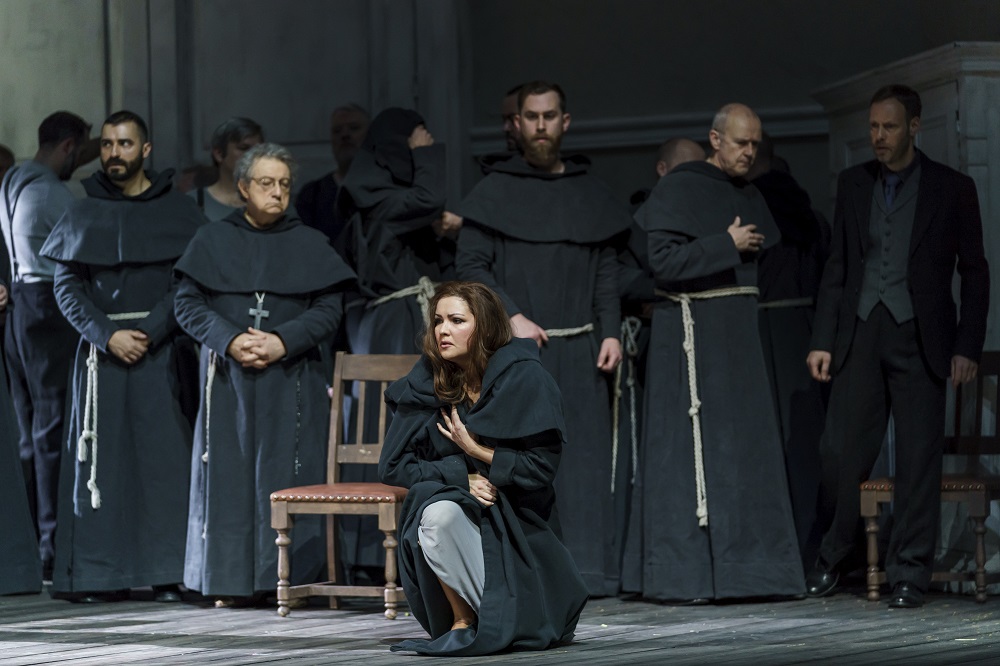La forza del destino, Royal Opera review - generous voices, dramatic voids | reviews, news & interviews
La forza del destino, Royal Opera review - generous voices, dramatic voids
La forza del destino, Royal Opera review - generous voices, dramatic voids
Generalised star turns from Kaufmann and Netrebko defuse Pappano's musical drama

When "Maestro" Riccardo Muti left the Royal Opera's previous production of Verdi's fate-laden epic, disgusted by minor changes to fit the scenery on the Covent Garden stage, no-one was sorry when Antonio Pappano, the true master of the house then only two years into his glorious reign, took over.
Perhaps I exaggerate, but the baseline in any production of this difficult, harsh but musically infinitely rich drama is that we should be moved to pity and terror by the lacerating attempts of two star-crossed lovers as they wander Spain and Italy to escape the vengefulness of the noble girl's brother, who wants their blood for the accidental death of their father. It's maddening, when Anna Netrebko and Jonas Kaufmann do so much vocally that is absolutely right, sometimes ideal, for the lirico spinto thrust of Verdi's writing for them, that they simply don't convey a hero and heroine in extremis. The singing of both is powerful, with plenty of quiet delivery as well as the artistry of the bel canto legacy; but in Netrebko's case the meaning is generalised, and Kaufmann has the thrill but not the Italianate sweetness of sorrow often needed for the demanding role of Alvaro. Loy has not been able to get them to jettison the stock hand gestures in favour of movements dictated by what they're singing about.  Consequently we never really get the power of the music to wound and torment, despite the characteristic intense high profile Pappano gets from the Royal Opera Orchestra in supporting lines: a bass phrase louring up to meet Kaufmann in his Act III aria, beautifully initiated by the clarinet who's his sorrowing companion in a scene where the military brass and offstage choruses, the nagging mid-range figures which drive the more heated parts of the big duets between Alvaro and the brother, Carlo (Ludovic Tézier, the testosterone-driven Verdi baritone to the life, but too loud too much of the time; pictured above with Kaufmann in Act II). The Overture is magnificent, and Loy looks set to deliver convincingly in two curtain-rises on two younger Leonoras acting out her religious fantasies in a bare room - the set could be borrowed from the same director's Tristan und Isolde, though hopefully the sight-lines are better from certain places in the house - before we get to the grown-up version.
Consequently we never really get the power of the music to wound and torment, despite the characteristic intense high profile Pappano gets from the Royal Opera Orchestra in supporting lines: a bass phrase louring up to meet Kaufmann in his Act III aria, beautifully initiated by the clarinet who's his sorrowing companion in a scene where the military brass and offstage choruses, the nagging mid-range figures which drive the more heated parts of the big duets between Alvaro and the brother, Carlo (Ludovic Tézier, the testosterone-driven Verdi baritone to the life, but too loud too much of the time; pictured above with Kaufmann in Act II). The Overture is magnificent, and Loy looks set to deliver convincingly in two curtain-rises on two younger Leonoras acting out her religious fantasies in a bare room - the set could be borrowed from the same director's Tristan und Isolde, though hopefully the sight-lines are better from certain places in the house - before we get to the grown-up version.
Yet despite the symmetrical image of the grey-haired hermit re-enacting her Pietà complex when finally reunited, but too late, with her Alvaro towards the end of the opera, the vision is not consistent. Loy seems to be telling us that for Leonora, there's no place but home, plus a monastery entrance and a crucifix replacing one of the walls. The panoramic dimension of the drama is lost; more worryingly, despite participants coming on at the end of each scene to set up the next, the curtain descends and we wait for some minutes for the resumption of the drama. How thrillingly Mark Wigglesworth at ENO made the case for driving on the music with no pause for applause, the open stage of Calixto Bieito's production allowing for a more epic sense of continuity.
 Wigglesworth started out by favouring Verdi's first version, with its shorter orchestral introduction, though Bieito rejected the abrupt ending where Alvaro joins the other corpses by leaping into the void. The trio Verdi composed as substitute in response to Catholic indignation at the suicide is an absolute beauty, and it ended the Royal Opera evening with a contained emotion not much in display elsewhere; here the sonorous combination of Netrebko, Kaufmann and Ferruccio Furlanetto as the Padre Guardiano (another loud one) and the pianissimo strings at the end justified Pappano's choice.
Wigglesworth started out by favouring Verdi's first version, with its shorter orchestral introduction, though Bieito rejected the abrupt ending where Alvaro joins the other corpses by leaping into the void. The trio Verdi composed as substitute in response to Catholic indignation at the suicide is an absolute beauty, and it ended the Royal Opera evening with a contained emotion not much in display elsewhere; here the sonorous combination of Netrebko, Kaufmann and Ferruccio Furlanetto as the Padre Guardiano (another loud one) and the pianissimo strings at the end justified Pappano's choice.
ENO's decision to place the second company scene in between the two confrontations between Alvaro and Carlo rather than as a divertissement finale made much more sense too. Loy's camp extravaganza (camp in more ways than one) may have wowed an audience ready to laugh at every turn of the melodrama - that in itself proves that the tension wasn't at the right pitch - but it had little connection with the hurly-burly of war. Programme images suggest the director was going for an Italian neo-realist film look, with a dash of more extravagant later Fellini, but the go-go boys, their choreography familiar from Otto Pichler's much more appropriate work in Barrie Kosky's stagings of The Nose and Carmen, don't fit, and some of the dancy-dancy movements for the chorus both here and in the earlier variety-act at the Hornochuelos inn are more worthy of an amateur opera company. A pity, because they sing superbly throughout.
The hard-to-motivate role of gypsy Preziosilla doesn't really work, either; she moves from trouser-suited glam to brothel-madam enigma in "consoling" Alvaro in Italy, and defuses the tension of his spat with Carlo by coming on in a green belly-dancer's costume. Finally she's hanging around, a wreck, at the monastery. Veronica Simeoni (pictured above with Netrebko and the Royal Opera Chorus) has presence - though it's not quite clear to what end - but the role needs a more opulent mezzo (maybe it will get that in the second cast's Aigul Akhmetshina later in the run). It was a surprise to see the ever-sympathetic Roberta Alexander as an anxious maid in the first scene, and there was promise from Michael Mofidian's Hornochuelos Alcade, hinting at a duel of the baritones with Tezier in Act II Scene 1.  Alessandro Corbelli's character-study of Brother Melitone (pictured above to the left of Netrebko) was, as ever, superbly observed, and he's still in fine voice. But we missed him when the first monastery scene yielded to the crucial duet between Leonora and the Father Superior. Looking a bit too chic in her menswear, Leonora would never reappear before the head of the monastery in her lingerie, or show her glossy hair to the assembled monks. Loy attempted a bit of the misogyny which Bieito had brought to the fore in the most harrowing scene of his hit-and-miss ENO production with the much more nuanced Tamara Wilson, but didn't follow through. Much better that vivid curate's egg, surely, than this director seeming to dither on what seemed to be a tight leash. But then maybe you can't achieve true music-theatre with the international set, especially if one of the principals isn't there for the final rehearsal. The lovers of star opera weren't disappointed, but Pappano deserved so much more, dramatically speaking, from his singers. Perhaps the best deal will be the BBC Radio broadcast on 25 May.
Alessandro Corbelli's character-study of Brother Melitone (pictured above to the left of Netrebko) was, as ever, superbly observed, and he's still in fine voice. But we missed him when the first monastery scene yielded to the crucial duet between Leonora and the Father Superior. Looking a bit too chic in her menswear, Leonora would never reappear before the head of the monastery in her lingerie, or show her glossy hair to the assembled monks. Loy attempted a bit of the misogyny which Bieito had brought to the fore in the most harrowing scene of his hit-and-miss ENO production with the much more nuanced Tamara Wilson, but didn't follow through. Much better that vivid curate's egg, surely, than this director seeming to dither on what seemed to be a tight leash. But then maybe you can't achieve true music-theatre with the international set, especially if one of the principals isn't there for the final rehearsal. The lovers of star opera weren't disappointed, but Pappano deserved so much more, dramatically speaking, from his singers. Perhaps the best deal will be the BBC Radio broadcast on 25 May.
rating
Explore topics
Share this article
Add comment
The future of Arts Journalism
You can stop theartsdesk.com closing!
We urgently need financing to survive. Our fundraising drive has thus far raised £49,000 but we need to reach £100,000 or we will be forced to close. Please contribute here: https://gofund.me/c3f6033d
And if you can forward this information to anyone who might assist, we’d be grateful.

Subscribe to theartsdesk.com
Thank you for continuing to read our work on theartsdesk.com. For unlimited access to every article in its entirety, including our archive of more than 15,000 pieces, we're asking for £5 per month or £40 per year. We feel it's a very good deal, and hope you do too.
To take a subscription now simply click here.
And if you're looking for that extra gift for a friend or family member, why not treat them to a theartsdesk.com gift subscription?
more Opera
 Orpheus and Eurydice, Opera Queensland/SCO, Edinburgh International Festival 2025 review - dazzling, but distracting
Eye-popping acrobatics don’t always assist in Gluck’s quest for operatic truth
Orpheus and Eurydice, Opera Queensland/SCO, Edinburgh International Festival 2025 review - dazzling, but distracting
Eye-popping acrobatics don’t always assist in Gluck’s quest for operatic truth
 MARS, Irish National Opera review - silly space oddity with fun stretches
Cast, orchestra and production give Jennifer Walshe’s bold collage their all
MARS, Irish National Opera review - silly space oddity with fun stretches
Cast, orchestra and production give Jennifer Walshe’s bold collage their all
 Káťa Kabanová, Glyndebourne review - emotional concentration in a salle modulable
Janáček superbly done through or in spite of the symbolism
Káťa Kabanová, Glyndebourne review - emotional concentration in a salle modulable
Janáček superbly done through or in spite of the symbolism
 Buxton International Festival 2025 review - a lavish offering of smaller-scale work
Allison Cook stands out in a fascinating integrated double bill of Bernstein and Poulenc
Buxton International Festival 2025 review - a lavish offering of smaller-scale work
Allison Cook stands out in a fascinating integrated double bill of Bernstein and Poulenc
 Tosca, Clonter Opera review - beauty and integrity in miniature
Happy surprises and a convincing interpretation of Puccini for today
Tosca, Clonter Opera review - beauty and integrity in miniature
Happy surprises and a convincing interpretation of Puccini for today
 Hamlet, Buxton International Festival review - how to re-imagine re-imagined Shakespeare
Music comes first in very 19th century, very Romantic, very French operatic creation
Hamlet, Buxton International Festival review - how to re-imagine re-imagined Shakespeare
Music comes first in very 19th century, very Romantic, very French operatic creation
 Falstaff, Glyndebourne review - knockabout and nostalgia in postwar Windsor
A fat knight to remember, and snappy stagecraft, overcome some tedious waits
Falstaff, Glyndebourne review - knockabout and nostalgia in postwar Windsor
A fat knight to remember, and snappy stagecraft, overcome some tedious waits
 Salome, LSO, Pappano, Barbican review - a partnership in a million
Asmik Grigorian is vocal perfection in league with a great conductor and orchestra
Salome, LSO, Pappano, Barbican review - a partnership in a million
Asmik Grigorian is vocal perfection in league with a great conductor and orchestra
 Semele, Royal Opera review - unholy smoke
Style comes and goes in a justifiably dark treatment of Handelian myth
Semele, Royal Opera review - unholy smoke
Style comes and goes in a justifiably dark treatment of Handelian myth
 Le nozze di Figaro, Glyndebourne review - perceptive humanity in period setting
Mostly glorious cast, sharp ideas, fussy conducting
Le nozze di Figaro, Glyndebourne review - perceptive humanity in period setting
Mostly glorious cast, sharp ideas, fussy conducting
 Fidelio, Garsington Opera review - a battle of sunshine and shadows
Intimacy yields to spectacle as Beethoven's light of freedom triumphs
Fidelio, Garsington Opera review - a battle of sunshine and shadows
Intimacy yields to spectacle as Beethoven's light of freedom triumphs
 Dangerous Matter, RNCM, Manchester review - opera meets science in an 18th century tale
Big doses of history and didaction are injected into 50 minutes of music theatre
Dangerous Matter, RNCM, Manchester review - opera meets science in an 18th century tale
Big doses of history and didaction are injected into 50 minutes of music theatre

Comments
I think you are being far too
I want to go away thinking
I want to go away thinking not JUST 'that was fantastic singing' but 'that's a fantastic opera, and I'm shaken to the core'. Which is how I felt, despite Bieito's production misses at times, about the ENO performance and especially Tamara Wilson. There is simply no comparison between her living the character and Netrebko's full-toned charisma. This goes deeper, I hope, than carping. Cried my eyes out in the Padre Guardiano-Leonora scene at the Coli. Nothing other than excitement here.
Why does Guardian review
Not sure you've posted in the
Not sure you've posted in the right place. The Arts Desk was up with the lark to cover this. And I agree with you, it's not flawed, and the crowd scenes if well staged widen the panorama of life in a time of war. They were done pantomimically here. I agree that Kaufmann lacked something dramatically - compared to their ENO counterparts, all three principals gave only generalised dramatic performances, great voices notwithstanding.
Thank you, David, for your
Thanks, too, for your
Thanks, too, for your intelligent reponse. I apologise if the public facility doesn't allow breaking up into paragraphs but I do recommend others to stick with it. My feelings on regietheater - not a negative term in my books - are that it can come up with fascinating alternatives, but they have to 'hear' the music and give it visual life in whatever way they please to succeed. Your citing of Alvaro's memories and his going off with Preziosilla is one such example of where that doesn't happen. Odd, because I usually find Loy very sensitive to such things. But in any case such a director can't hope to do too much with 'international' singers. I believe Richard Jones has all but given up on them after a bad experience in Munich, albeit at the highest level.